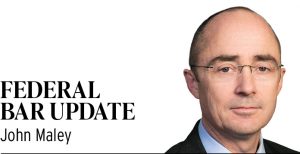Subscriber Benefit
As a subscriber you can listen to articles at work, in the car, or while you work out. Subscribe Now The Northern District of Indiana approved amendments to five local rules effective Feb. 25, specifically to Local Rules 5-3, 6-1, 7-1, 7-6 and 56-1. Several of the amendments are significant and impact everyday federal civil practice.
The Northern District of Indiana approved amendments to five local rules effective Feb. 25, specifically to Local Rules 5-3, 6-1, 7-1, 7-6 and 56-1. Several of the amendments are significant and impact everyday federal civil practice.
The redlined version of the amendments is found on the court’s website; the clean rules are available here.
Local Rule 5-3. The amendments to this sealed-filings rule removes text that indicated sealed criminal filings were to be made manually on paper. Sealed criminal filings must now be made electronically.
Local Rule 6-1. This extension of time rule was amended to remove potential confusion as to extensions in cases with a pro se party. The amendments now provide that neither attorneys nor pro se parties are required to consult with each other before filing a motion to extend time and that the automatic initial extension of time is not available in cases with a pro so party.
Local Rule 7-1. This motions-practice rule was amended to remove potential confusion as to whether reply briefs were permitted without leave of court for motions made pursuant to Rule 12(b). The amended rules clarifies that reply briefs are permitted.
Local Rule 7-6. This new local rule replaces abrogated Local Rule 8-1 that addressed pro se complaints. Winning the award for the shortest local rule, this now reads, “The court may require parties representing themselves to use clerk‐supplied forms.” The committee comments explain the amendment as follows: “Local Rule 8‐1 is abrogated by new Local Rule 7‐6 to include any pleading, motion, or other paper. Local Rule 7‐6 encompasses locally adopted complaints as well as any other form the court may choose to supply. It also permits the use of non‐clerk‐supplied forms when appropriate.”
Local Rule 56-1. This summary-judgment local rule was significantly redrafted after two years of study and work by the local rules committee and a summary judgment subcommittee. Significant changes include a requirement that the facts be separately numbered for ease of response and then court review, and requiring admissibility issues to be in the briefing rather than a separate motion to strike.
Given the importance of summary judgment practice and compliance with the court’s local rules at summary judgment, the full new rule is set forth below:
N.D. Ind. L.R. 56‐1 Summary Judgment Procedure.
(a) Moving Party’s Obligations. A party moving for summary judgment must separately file:
(1) a motion;
(2) a supporting brief;
(3) a Statement of Material Facts with numbered paragraphs for each material fact the moving party contends is undisputed which includes:
(A) a short statement of each fact; and
(B) a citation to evidence supporting each fact; and
(4) the Notice in Appendix C, if an opposing party is unrepresented.
(b) Opposing Party’s Obligations. A party opposing the motion must, within twenty‐eight days after the moving party served the motion, separately file:
(1) a response brief; and
(2) a Response to Statement of Material Facts which includes:
(A) a verbatim restatement of the Statement of Material Facts;
(B) a correspondingly numbered response following each paragraph of the Statement of Material Facts;
(C) a citation to evidence supporting each dispute of fact; and
(D) additional facts in a section titled Additional Material Facts with numbered paragraphs continuing the sequential numbering of the Statement of Material Facts for each additional material fact the opposing party contends is undisputed which includes:
(i) a short statement of each fact; and
(ii) a citation to evidence supporting each fact.
(3) In cases where any party is unrepresented, the opposing party is not required to restate verbatim the Statement of Material Facts.
(c) Reply. The moving party may, within fourteen days after a response is served, separately file:
(1) a reply brief; and
(2) a Reply to Statement of Additional Material Facts which includes:
(A) a verbatim restatement of the Statement of Additional Material Facts;
(B) a correspondingly numbered response immediately following each paragraph of the Statement of Additional Material Facts; and
(C) a citation to evidence supporting each dispute of additional fact.
(3) In cases where any party is unrepresented, the moving party is not required to restate verbatim the Statement of Additional Material Facts.
(d) Additional Briefs. Additional briefs must not be filed without leave of court.
(e) Citations to the Record. The court may find a fact is not supported if the citation does not include a page or paragraph number to evidence in the record which can be presented in an admissible form unless the court may take judicial notice of the fact.
(f) Disputes About Evidence. Disputes about the admissibility or materiality of evidence must be raised in the parties’ briefs. A separate motion to strike must not be filed.
(g) Oral Argument. The court will decide summary‐judgment motions without oral argument unless a request under L.R. 7‐5 is granted or the court directs otherwise.•
John Maley is a partner with Barnes & Thornburg LLP, practicing federal and state litigation, employment matters and appeals. He clerked for Judge Larry McKinney from 1988-90, serves as chair of the Local Rules Advisory Committee, S.D. Indiana, and is a member of the Local Rules Advisory Committee, N.D. of Indiana. Opinions expressed are those of the author.
Please enable JavaScript to view this content.
